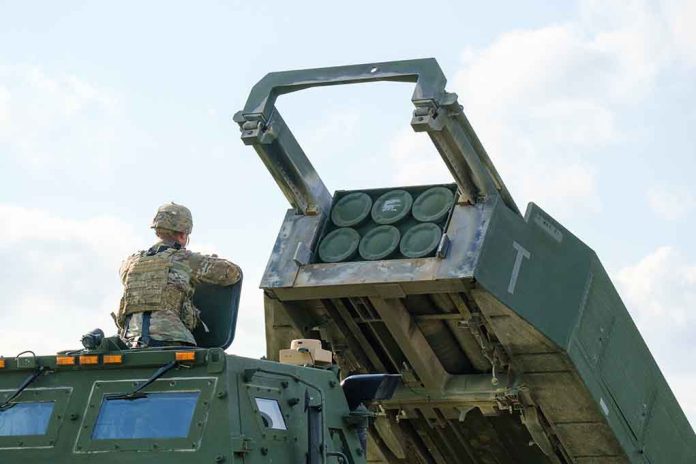
President Trump pledges to use decisive force in defense of America and allies while warning European nations they must increase defense spending or face potential U.S. withdrawal.
Key Takeaways
- President Trump delivered a firm commitment to use military force when necessary to defend America and partners during his address at Qatar’s Al Udeid Air Base.
- European security experts warn that a U.S. withdrawal from Europe could have destabilizing effects comparable to a nuclear attack by Russia.
- Trump’s administration appears to be considering two potential strategies: using withdrawal threats as leverage to increase European defense spending, or strategically retrenching from Europe to focus on China.
- The President has promised “substantial” pay raises for U.S. troops, reinforcing his commitment to military strength.
- European nations are being advised to dramatically increase defense spending and develop collective capabilities in preparation for potential reduced American support.
Trump Reasserts America’s Military Resolve While in Qatar
President Trump made it clear during his Gulf region tour that American military power remains ready to defend both national interests and allies when necessary. Speaking to troops at the Al Udeid Air Base in Qatar, Trump emphasized his administration’s dedication to peace through strength while not shying away from using force when required. While his priority remains ending conflicts rather than starting them, his statement underscores the administration’s resolve to meet potential threats with decisive action, particularly in volatile regions where American interests and partner nations face ongoing challenges.
The President further reinforced his commitment to military readiness by announcing plans for “substantial” pay raises for U.S. troops, a move that signals the administration’s focus on maintaining a well-equipped and well-compensated fighting force. This approach aligns with Trump’s broader strategy of building military capability while demanding allies contribute more meaningfully to their own defense. The announcement comes amid increasing global tensions and reflects the administration’s understanding that deterrence requires both capability and credibility.
𝗢𝗽𝗶𝗻𝗶𝗼𝗻: 𝗡𝗭 𝗺𝘂𝘀𝘁 𝗶𝗻𝘃𝗲𝘀𝘁 𝗶𝗻 𝗱𝗲𝗳𝗲𝗻𝗰𝗲 𝗼𝗿 𝗿𝗶𝘀𝗸 𝗶𝘀𝗼𝗹𝗮𝘁𝗶𝗼𝗻 𝘄𝗶𝘁𝗵 𝗧𝗿𝘂𝗺𝗽 𝟮.𝟬
The following op-ed is by ACT MPs Mark Cameron and Laura McClure.
With Donald Trump heading back to the White House next week, much discussion has focused…
— ACT New Zealand (@actparty) January 14, 2025
European Concerns Over Potential U.S. Withdrawal
A recent analysis from the European Union Institute for Security Studies has raised serious concerns about potential shifts in U.S. policy toward Europe. The report suggests that a significant reduction in American military presence could be as destabilizing for European security as a nuclear attack by Russia. This stark assessment comes as European leaders watch Trump’s statements about NATO commitments and defense spending with growing unease. The President has consistently criticized European nations for failing to meet their agreed-upon defense spending targets of 2% of GDP.
“We can’t rule out the possibility that America might say “no” to Europe on issues that threaten it,” said President Zelenskyy.
The EU analysis outlines two potential scenarios for Trump’s approach to Europe. In the first, labeled “Tit for Tat,” the administration would use the threat of withdrawal as leverage to force Europeans to increase defense spending, preferably on American weapons systems, while making trade and technology concessions. The second scenario, more concerning for Europeans, envisions a strategic “So Long Europe” retrenchment where the U.S. substantially disengages from European security to focus primarily on competition with China.
— Jim Hanson (@JimHansonDC) January 23, 2025
Europe Urged to Prepare for Less American Support
European security experts recommend urgent preparation for a potential reduction in American security guarantees. The EU is being advised to substantially increase defense spending across member states, develop collective capabilities for conventional deterrence, and build strategic enablers like airlift and intelligence capabilities. These preparations reflect growing concern that Europe has grown too dependent on American security guarantees without developing sufficient independent defensive capabilities, a situation President Trump has repeatedly criticized.
The recommendations include developing the capacity to absorb both hybrid and conventional attacks and scaling up weapons production to maintain security even without American support. This marks a significant shift in European strategic thinking, which has relied heavily on American security guarantees since the end of World War II. President Trump’s firm stance on defense burden-sharing appears to be forcing a long-overdue reconsideration of European security arrangements, potentially leading to a more balanced transatlantic partnership where European nations take greater responsibility for their own defense.









